Root Canals Dental Services
Do you have a tooth infection? If so, that infection can end up causing a great deal of damage to the structure of your tooth and can also impact your entire well-being if left ignored. At Yazdani Family Dentistry, we offer root canal therapy in Kanata and Kemptville, to restore the function of the tooth and relieve any associated pain.
To Book an Appointment

KEMPTVILLE & KANATA
ROOT CANAL
Root Canal to Save Teeth & Prevent Further Damage
All teeth have root canals that are filled with blood vessels, a pulp (the innermost part of your tooth), and nerves that branch off from the top of the tooth until they reach the tip of the root. When an infection occurs or if the tooth’s pulp becomes harmed, it can begin to affect the root. A host of issues can then occur, such as pain and sensitivity, disease, and an abscess.
What is a Root Canal
A root canal is a series of procedures performed on somebody to save an infected tooth. Root canals, formerly known as an endodontic treatment is one of the more intimidating dental procedures people have to undergo but it isn’t nearly as scary as people may think!
Removing the mystery surrounding a root canal surgery and telli mg you exactly what is done is a great way to put your mind at ease so you hopefully won’t avoid the treatment in the future! Your teeth will thank you!
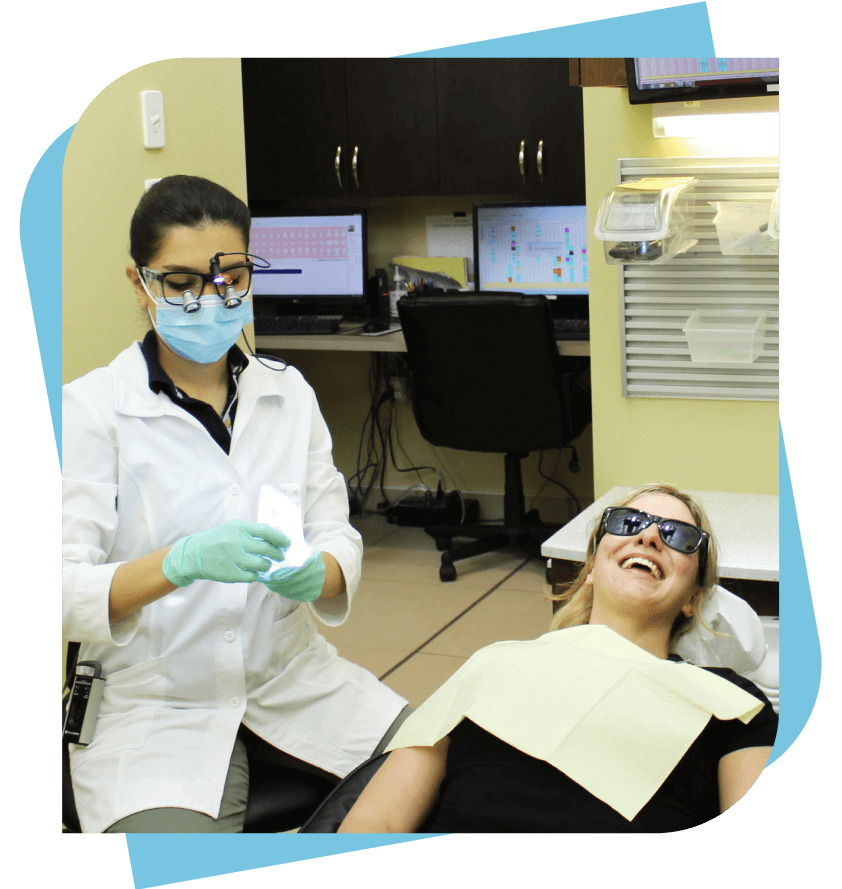
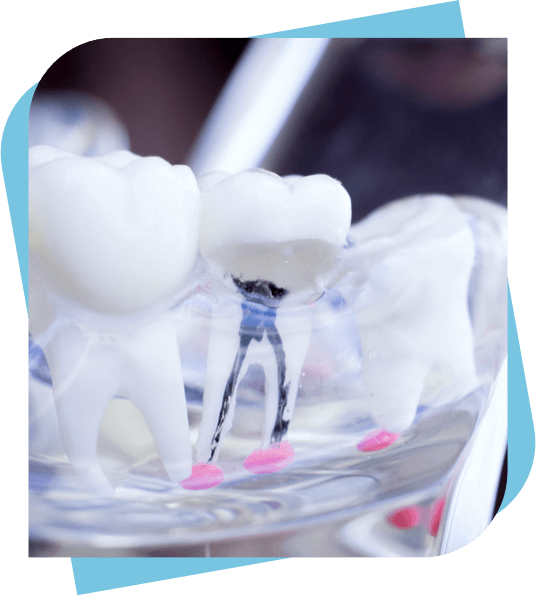
DON'T PUT OFF YOUR TEETH!
Benefits of a Root Canal
Attempting to save and salvage the tooth has many benefits over an extraction. For one, a crown can provide stability and also address other issues while improving the overall appearance of the tooth. The alternative (tooth extraction) can lead to a series of other issues, from shifting teeth to TMJ disorders. If you have a tooth infection or are suffering from pain and sensitivity, it’s important to visit your dentist for an assessment. A root canal may be recommended to remove the damage and save your tooth. To learn more about our procedure, contact us today!
Many people fear the therapy. However, the experience is very similar to having a filling placed. If any deep cleaning of the root is required, anesthesia will be used to ensure that patients are comfortable.
DO YOU REQUIRE
Emergency Dental Services?
Our clinics offer same-day appointments for your emergencies. If you need a dentist to help you in a crisis, please do not hesitate — call us right away!
REPAIRING BLOOD VESSELS, PULP & NERVES
How We Go About Root
Canal Treatment
Our therapy removes any of the infected or decayed pulp from the tooth. The dentist will then fill the canal with a safe substance to prevent infection and restore the healthy part of the tooth. It will then be capped with a crown, inlay, or onlay to provide extra strength and durability. This treatment has a high success rate and prevents the need of having the tooth completely extracted. In a series of visits, the diseased tissue will be removed, the inner chamber cleansed, canals reshaped, and then finally filled and sealed to prevent any further damage.
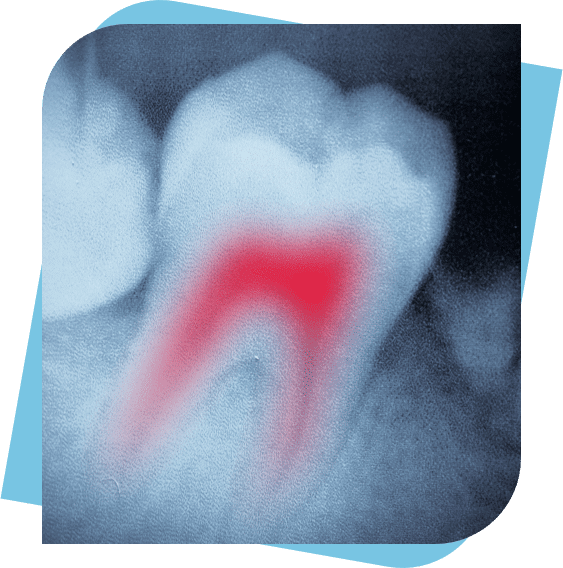

When Are Root Canals Necessary?
How Is A Root Canal Performed?
A root canal treatment is performed in 1-2 appointments depending on the progression of the infection in your mouth, and is broken down into 8 simple steps.
Local Anesthesia
One of our dental experts will administer a local anesthetic to the tooth and surrounding area, essentially “freezing” your mouth so you don’t feel any pain during the treatment!
Apply a Dental Dam
Once your mouth is frozen, our dental expert will insert a flexible dental dam to cover the unaffected teeth in your mouth to reduce the threat of bacteria spreading from the infected tooth during the treatment! This dental dam is typically made out of vinyl or rubber.
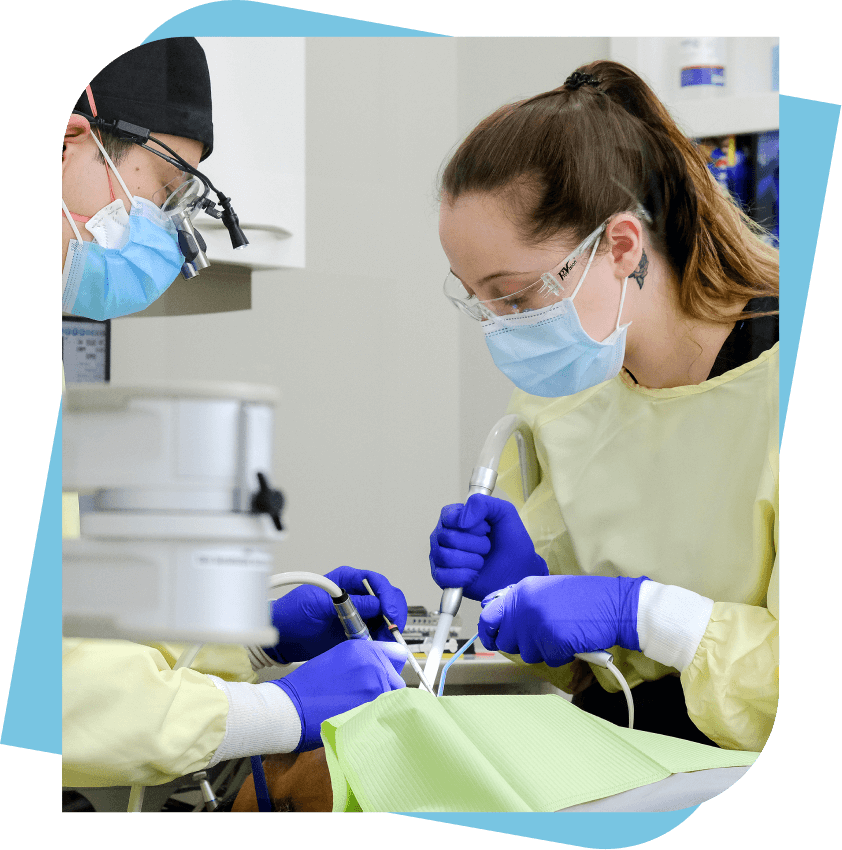

Drilling
Now we are ready for the healing no to begin! In order for our dental expert to access the infection in the tissue below your tooth, they will drill a small hole in your tooth! Don’t worry you won’t feel any pain at all, it will feel just like you’re getting a filling.
Remove Nerves & Infected Tissue
Now it’s time to remove all the nerves and infected tissue from your infected tooth. Our dental professionals will remove all infected tissue and nerves through the tiny hole they drilled. You won't be able to feel any pain once the nerves have been removed from the tooth!
Disinfecting
This is the most important part of the treatment: disinfecting your tooth! Our dental expert will make sure there is no remaining bacteria in or surrounding your tooth to make sure you are ready for the next step!
Insert Flexible Root Canal Tools
Now that your tooth is completely disinfected, it’s time for us to insert a flexible tool into your mouth that will help us to shape the area where the filling will be inserted to prevent any further infection! This is a quick and painless process.
Apply the Filling
Now it’s time to apply the filler and sealant to the tooth! This will prevent the tooth from becoming infected again in the future. Once the sealant is applied to the filling, this is typically the last step in the process! There are some who need a post during this treatment, so we will walk you through that as well.
Apply Post if Needed
A post may be inserted into your tooth during the filling process to help keep a tooth in place, but that is totally dependent on the structure of your tooth! If a post is required, your dental professional will inform you ahead of time.
One your root canal treatment is complete, most patients are prescribed an antibiotic to help you fight off any remaining infection there may be.
It is normal to experience minor pain and tenderness around the treated area after your anesthetic wears off, but this should only last a couple days. A small price to pay for excellent dental health!
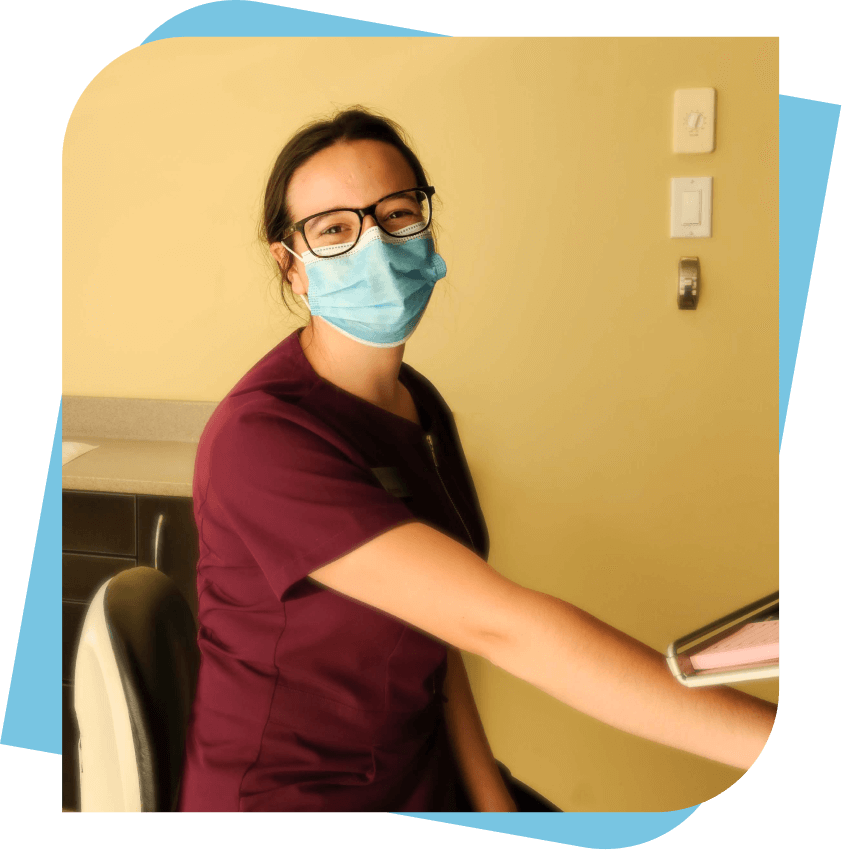

Root Canals: Fact vs. Fiction
There is such a stigma surrounding root canal treatments, rumours and myths have been treated as fact for far too long. We are here to put your mind at ease and separate the fact from the fiction for you!
The Treatment is Painful
Back in the day, this statement had some truth to it. However, with all the advancements of modern technology combined with new treatment methods having a root canal performed is no more uncomfortable than having a cavity filled.
The Treatment Causes Illness
This rumor has been around for nearly a century, and it is simply untrue. This accusation was put forth long before we had a modern understanding of dental treatments and medicine in general. There is no scientific evidence to support this claim.
Tooth Extraction is Better than a Root Canal
It’s a fact that preserving a natural tooth is always going to be a better option than extracting a tooth. Medical advancements have come a long way and a dental implant comes close to the feel of a natural tooth, but that requires extensive surgery and a lengthy recovery time.
Flippers and dental bridges are another option, however they require more maintenance and treatments for the remaining teeth in your mouth. Trust the experts and opt for a root canal treatment. It’s the safest bet!

SIGNS TO WATCH FOR
What are the Common Symptoms?
Only a dentist can determine 100% whether you need a root canal or not. But there are some telltale symptoms that can indicate a problem:
- Persistent pain around the mouth area
- Discolouration of teeth
- Painful to touch
- Chipped or cracked area
- eating or drinking hot or cold items
- Swollen area or tenderness of gums
- A loose tooth
If you’re experiencing any of these symptoms or pain and discomfort, you don’t have to suffer in silence. Our dedicated dental team at Costello Family Dentistry has years of professional experience, providing root canal treatments that are gentle, fast, and effective.
We can take a look, determine the cause and the best course of treatment to eliminate the pain and restore your teeth for a healthy and beautiful smile. Contact us today to book an appointment.

Root Canals
Frequently Asked Questions
We get a lot of questions, naturally, about the wide range of dental services we perform here at our Kanata & Kemptville dental clinics. Here are the answers to the most frequently asked questions. Don't see yours answered here? Feel free to reach out to Yazdani Family Dentistry.
It is perfectly normal to feel tenderness in the area for a few days after your root canal. It is also normal to feel some soreness in your jaw after keeping it open for the entire procedure. Root canal pain usually peaks 17 to 24 hours after the procedure. Keep your head elevated when sleeping for the first few nights, and use over-the-counter pain medications to alleviate pain. If severe pain lasts for more than a few days, notify us immediately.
There are a few ways that you can tell if you might need a root canal. You might need one if you notice:
- Severe tooth pain and sensitivity that worsens over time.
- Swollen or tender gums near the infected area combined with bad breath
- Pus-filled pimple in the gums around the tooth.
- Darkening of the tooth.
The dentist will be able to see an abscess in the jawbone when he looks at your dental x-rays.
It is possible to complete a root canal in a single appointment but that may not always be the best course of action. Particularly severe infections would benefit from a second appointment. This will allow the tooth to dry in between sessions and allow the dentist or endodontist to disinfect the root canals a second time and ensure it has been fully disinfected. They will recommend the best course of action for your specific case.
It is important to watch what you eat for two to three days after having a root canal treatment. Stick to soft, lukewarm foods. Avoid foods that are too hot or cold as the treated tooth will be sensitive to temperature. Foods that are hard, tough, crunchy or sticky should be avoided until the treated tooth has been capped with a crown or filling.
Root canal infections require treatment. They will not go away on their own. Leaving an infected root canal untreated will lead to severe damage to a tooth that may result in it needing to be extracted if it doesn’t fall out on its own. Worse yet, the infection can spread to surrounding teeth and bone structures and even to other parts of the body which can lead to all sorts of adverse health effects. Contact us for an appointment if you suspect that you have an infected root canal.





